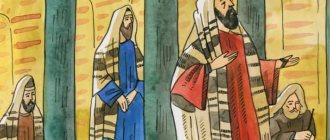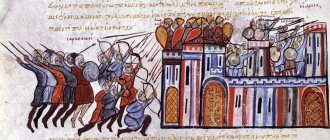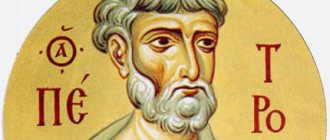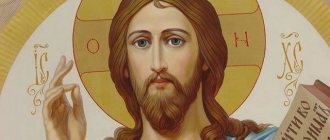The Bible is a storehouse of wisdom
The book of books - the Bible - has enriched our language with many popular expressions. We often use most of them to convey thoughts figuratively. One such expression is “the ways of the Lord are mysterious.” We use it to encourage a loved one in the event of difficult life trials. We say it when we are surprised by the intricacy of random events that led to a successful solution to a complex issue. We often hear this phrase from the church pulpit during a priest’s sermon. What is the original meaning of the phrase “the ways of the Lord are mysterious” and who first uttered these words?
The road to the temple - the ways of the Lord are mysterious
About the authorship of the expression
The most succinct reflection on the inevitability of what is happening was expressed by the Apostle Paul. It was from his pen that the expression “The ways of the Lord are mysterious” came out, which in Latin sounds like Viae Domini imperceptae sunt or Investigabiles viae Domini. You can find this phrase in the New Testament Epistle to the Romans, where a disciple of Christ writes about the incomprehensibility of God’s plans. He preaches to admire the Creator's intentions rather than try to understand their root causes.
You can find the phrase in the New Testament letter to the Romans
The ways of the Lord are mysterious: what does this mean?
The Apostle Paul is the author of the expression “the ways of the Lord are mysterious.” In his letter to the Romans he writes:
“Oh, the depth of wealth and wisdom and knowledge of God! How incomprehensible are His destinies and unsearchable His ways!” (Rom. 11:33).
Thus, in the original source the word “unsearchable” is used. This means that it is impossible to explore God’s plans, that is, to find out and study them. The human mind is not able to follow the “footsteps” of the Divine plan and understand all its turns. The interpreter of the Gospel, Blessed Theophylact, writes about this:
“He did not say about the ways: incomprehensible, but: unsearchable, that is, they cannot even be explored. His ways, that is, the methods of economy, not only cannot be comprehended, but even explored, that is, one cannot even see a trace of them.”
The Apostle Paul in his words expresses amazement at the Wisdom of God. He is amazed by the greatness of His Providence for the universe and each individual person.
Over time, the word “unsearchable” was replaced by the familiar “inscrutable” to us. Translated from Slavic, this means something that cannot be expressed in words. Something that defies understanding is incomprehensible to the mind.
Thus, the general meaning of the popular expression in question is the following: a person is unable to penetrate the depths of Divine Providence and identify the cause-and-effect relationships of what happened.
The meaning of the phrase “the ways of the Lord are mysterious” lies in the impossibility of cognizing the wisdom of God’s Plan. The phrase is used to express the idea that even the difficult and sorrowful events of life are controlled by the Lord for the salvation of the immortal soul of man.
“No one will argue with God, and He does not give an account to anyone, and one thing is certain, that everything that He does is for good, is perfect goodness” (Archimandrite John Krestyankin).
Parables explaining the meaning
First parable
Photo: Privolgsk.cerkov.ru
In Christianity, this phrase is found in two famous clergy. The first tells about a sunken ship from which only one sailor managed to escape. Having climbed ashore, he built a hut and began to wait for him to be rescued. A lot of time passed, a fire broke out in his home, destroying everything he had managed to stock up on.
At this moment, the young man despaired, beginning to exclaim that he had undeservedly received such a punishment. At that moment a ship appeared on the horizon. It turned out that the team examined the high fire, deciding that someone needed help. Otherwise, they would never have taken this route near the island.
God works in mysterious ways
In the first line of the Creed, Christians confess the Lord as Almighty. This means that He holds everything in His Divine hand, directing everything to good. The all-wise Creator, who harmoniously arranged the Universe, maintains consistency and order in it, seeing everything outside of time and space.
“God knows everything in advance, what was, and what is, and what will be; He knows everything before the event, and sees it as if it were inherent and accomplished before Him, because everything from God has its being and existence and everything, before being, is in His creative mind” (Rev. Simeon the New Theologian).
The Divine Plan extends to His entire creation: from the Heavenly Powers to the lilies of the field. But it is impossible for the limited human mind to comprehend the full depth of God’s Providence. For man, the paths are inscrutable, through which the Lord Almighty, as the Source of good, leads all events to salvation and goodness.
“God rules the world, and everything that happens in heaven and under heaven is done according to the judgment of the All-Wise and Almighty God, incomprehensible in His wisdom and omnipotence, incomprehensible in His government” (St. Ignatius Brianchaninov).
At the age of one, for a child, his apartment seems like the whole world. As he grows up, he learns about the existence of many countries. All this happens gradually; an unprepared child’s mind is not able to perceive the scale of space. Likewise, adults, who always remain children of the Heavenly Father, should not try to comprehend the full depth and wisdom of the Divine Plan.
The Lord Himself warned Abba Anthony about this. The following story in Fatherland (a collection of biographies of ascetics and monks) tells about this.
Anthony the Great, an early Christian desert monk, pondered for a long time about the depth of Divine Providence. Why do some live to a ripe old age while others die in infancy? Why do evil people often prosper and enjoy material wealth, while good people experience poverty and misfortune? After a long prayer, Abba Anthony heard a voice: “Antony! Pay attention to yourself and do not subject yourself to the study of God’s destinies, because this is harmful to your soul.”
The Dream of a Hermit Monk
In one of the caves, a hermit monk lived righteously and in prayer for many years. But he was haunted by God’s plans; he dreamed of penetrating their essence and possessing knowledge. One day in a dream a man came to him and called for him. The monk spent three days with him on the road, and each of them brought him more and more disappointment in his faith. On the first night, the monk's companion stole a golden cup from the peasant's house, given by a neighbor in honor of reconciliation after a long quarrel. After the second night, he set fire to the hut of the poor man who sheltered them. And on the morning of the third day, he asked the son of one of the peasants, who gave them shelter, to be a guide, and threw him into a stormy river. He suppressed all the monk’s disturbances with a phrase about God’s plans.
At the end of the journey, the man revealed to the elder the true meaning of the things that happened during the journey. As it turned out, the golden cup was poisoned, and on the ashes of his house the beggar would find a rich treasure hidden by his ancestors and completely change his life. And the dead child, at the instigation of his father, was to become a bloodthirsty robber and destroy several thousand innocent souls. After the death of his only son, the father will grieve greatly and become the most devout person in his village. He will be able to help many with advice and deed and will die at an old age.
After this story, the mysterious man disappeared, and the monk woke up. From then on, he learned to trust the Lord without asking for explanations.
Thy will be done!
The wisest king of all times and peoples, Solomon, looking at the greatness of the Wisdom of God, exclaimed:
“For what man is able to know the counsel of God? or who can understand what is pleasing to the Lord?” (Wis.9:13).
It was precisely this thought that the Apostle Paul expressed when he used the popular expression “the ways of the Lord are mysterious.” At the same time, the apostle further adds the praise of the Lord, saying:
“For all things are from Him, and by Him, and to Him” (Rom. 11:36).
We are called to trust God as the All-Wise Ruler of all things. And in the words of Blessed Theodoret:
“It is fitting for all to look to Him, giving thanks for what is already there and asking for care for the future.”
The Lord Jesus Christ himself teaches Christians to have complete trust in the Lord when he gives his disciples a sample prayer in which the words sound:
“Thy will be done on earth as it is in heaven” (Matthew 6:10).
Further, Christ shows an example of completely surrendering himself into the hands of Divine Providence. As a person, he was afraid of future torment and death. And praying until he sweated blood before His suffering on the cross in the Garden of Gethsemane, Christ repeated:
“Nevertheless, not as I will, but as You will” (Matthew 26:39).
And Divine Providence arranged it in such a way that the shameful execution of Jesus Christ on the cross became the door to the Heavenly Kingdom for all who believe in the saving Sacrifice of Christ.
Thus, in the life of every person, even seemingly dead-end situations and sorrowful events are arranged by the Lord for good. A Christian must, with prayer and trust in God, accept everything that happens to him. This is precisely the meaning of humility - to see the ruling Hand of the Divine Father in everything.
“We must be convinced of only one thing, that God sends everything for our benefit, and not to explore the method itself, and not to grumble, and not to be discouraged when we do not know it. This is what Providence consists mainly of, that the reasons are incomprehensible to us” (St. John Chrysostom).
The essence of the phrase
The priests emphasize that the meaning of this sentence can only be understood with the heart, and not with the mind. These words can be interpreted as follows:
- God has his own plans for everything, which are simply impossible for an ordinary person to understand.
- It is impossible to know which path God has chosen for man.
- You should not try to look into the future - this is considered a sin.
- It is dangerous to think that you can do something on your own, without God's help. This is a sign of pride.
An Orthodox person must believe in the Lord and give thanks for every event that happens in his life. The Church teaches us to endure even the most difficult trials, to be patient and wait for God’s mercy.
In early Christianity, the attitude towards God was different; the Lord was respected much more. People believed that He was leading them along the only possible path that they deserved. Only this path could lead their souls to purification, to unity with the Almighty.
We must guard against arrogance in these times when many believe they can control their own destiny. When situations happen that change everything in an instant, for example, the death of a loved one or illness, people remember these words and begin to understand their meaning.
For a Christian there are no coincidences
It may often seem to a person that life is a collection of random events. But the Orthodox believer knows that every phenomenon is a link of Divine Providence in a single chain of the order of the world. When we stand still, it may seem to us that the forest around us is dense and scary. And only after walking forward, we will see that behind the spreading branches there is a calm, picturesque lake. Thus, difficult events in our lives can be the beginning of positive changes. You just need to trust and thank God.
The following parable illustrates this clearly.
One peasant's horse disappeared. In response to his neighbors’ worries, he calmly replied: “My horse just disappeared. All the will of God". After some time, the missing animal itself came to the stall, and even brought a young stallion with it. The neighbors groaned with envy and congratulated the happy owner of two excellent horses. To this the peasant only smiled quietly and thanked God.
The peasant's son decided to try out a new horse. While riding, he fell off his horse and broke his leg. In response to the sorrowful lamentations of his neighbors, the peasant praised God and said that it was so pleasing to the Lord. Friends gave up on the quirky old man: his son was sick, but he was happy. But suddenly the war came, and all the healthy guys were taken to fight. Only the son of an old peasant remained in the village with his broken leg.
So, a person who trusts the Lord and His Divine Providence has no accidents. Each event is like another stitch that the Wise Lord makes on the fabric of human life and the entire world history.
“There are no coincidences in life and cannot be, God the Provider rules the world, and every circumstance has a higher spiritual meaning and is given by God to fulfill this eternal goal - to know God” (Archimandrite John Krestyankin).
Fatalism and faith
When describing what the phrase in question means, it is necessary to note one more semantic emphasis, which is also very significant. This emphasis should be expressed in the words: “No one knows his fate, only the Lord.” Only the Lord really knows about the fate of this world and each person individually.
Therefore, an individual should neither complain about fate nor try to guess something significant and have 100th confidence in something. Ultimately, the determining factor is the divine principle, which puts the whole world in order.
Should a believer then completely surrender to fatalism (a concept in which every event is considered predetermined and human choice does not matter) and do nothing? Of course, for an Orthodox the question is banal and rhetorical and the answer to it is clearly negative. After all, everyone knows about free will and what this means is the need for everyone’s personal choice.
In particular, each individual chooses whether to go to the salvation of his own soul or succumb to passions and sins. Of course, the ways of the Lord are inscrutable, but people are given a choice between winning the Kingdom of Heaven and inaction on this path.









